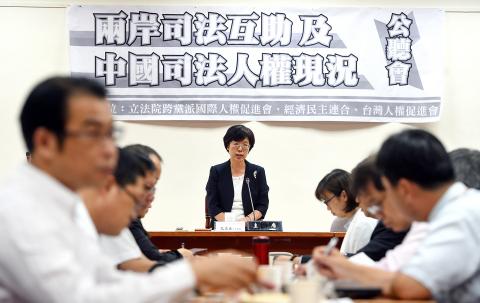The detention of Hong Kong activist Joshua Wong (黃之鋒) in Thailand raised concerns that Taiwanese who travel abroad could face deportation to China for advocating independence, civil campaigners said yesterday at a Legislative Yuan hearing.
“Even though [Wong] was deported back to Hong Kong, we are concerned that the day will come when activists will be sent to China, particularly a Taiwanese could be deported to China from a foreign nation on the basis of violating China’s ‘Anti-Secession’ Law,” said Democratic Progressive Party (DPP) Legislator Yu Mei-nu (尤美女), who chaired the hearing sponsored by the Legislative Yuan’s Parliamentary Cross-Party Group on International Human Rights, Taiwan Association for Human Rights and the Economic Democracy Union.
The jurisdiction of Chinese courts over Taiwanese has been a contentious issue following Kenya’s extradition of Taiwanese implicated in telecommunications fraud to China earlier this year. In a separate fraud case in Malaysia, Taiwanese authorities fought to secure several suspects’ extradition to Taiwan, only to see them released on arrival for lack of evidence.

Photo: Liao Chen-huei, Taipei Times
“To a certain degree, China has forced Taiwan’s legal system into making seemingly unjust decisions by not giving us sufficient evidence or only letting us extradite minor suspects, while they take the main ones. This creates the impression that Taiwan’s legal system is powerless to tackle this type of crime,” Taiwan Association for Human Rights executive committee member Lee Chia-wen (李佳玟) said, adding that addressing extradition issues has become more difficult since President Tsai Ing-wen (蔡英文) took office, which preceded a cooling of cross-strait ties.
Lee said that claims of jurisdiction over fraud cases should be based on the destination of money transfers rather than the suspects’ nationalities in a bid to establish a clear legal claim to jurisdiction.
“Besides protesting against the extraditions, the Executive Yuan and Legislative Yuan should consider including human rights considerations in deciding whether to execute the Cross-Strait Joint Crime-Fighting and Judicial Mutual Assistance Agreement (海峽兩岸共同打擊犯罪及司法互助協議),” Economic Democracy Union convener Lai Chung-chiang (賴中強) said, adding that Ministry of Justice guidelines do not mention human rights.
He cited a lack of judicial independence, forced confessions, admission of illegally acquired evidence and other concerns as reasons to reject Chinese extradition requests on human rights grounds.
According to Ministry of Justice statistics, Taiwan has extradited 12 people to China since the agreement was signed in 2009, while China has extradited 462 people to Taiwan.
Bruce Chung (鍾鼎邦), a Falun Gong practitioner, said that he was allowed to contact his relatives after being detained during a 2012 trip to China only after beginning a hunger strike.
“No one knew that I had been detained. I was kidnapped and ‘evaporated,’” he said. “When I demanded to be allowed to notify my family and to be accompanied by a lawyer, they denied my requests on the basis of ‘national security.’”
Following an international outcry, Chung was released after 54 days in detention, but had to sign a “repentance statement” for allegedly helping Falun Gong activists hijack the signal of a Chinese television station in 2003.

Taiwanese can file complaints with the Tourism Administration to report travel agencies if their activities caused termination of a person’s citizenship, Mainland Affairs Council Minister Chiu Chui-cheng (邱垂正) said yesterday, after a podcaster highlighted a case in which a person’s citizenship was canceled for receiving a single-use Chinese passport to enter Russia. The council is aware of incidents in which people who signed up through Chinese travel agencies for tours of Russia were told they could obtain Russian visas and fast-track border clearance, Chiu told reporters on the sidelines of an event in Taipei. However, the travel agencies actually applied

Japanese footwear brand Onitsuka Tiger today issued a public apology and said it has suspended an employee amid allegations that the staff member discriminated against a Vietnamese customer at its Taipei 101 store. Posting on the social media platform Threads yesterday, a user said that an employee at the store said that “those shoes are very expensive” when her friend, who is a migrant worker from Vietnam, asked for assistance. The employee then ignored her until she asked again, to which she replied: "We don't have a size 37." The post had amassed nearly 26,000 likes and 916 comments as of this

New measures aimed at making Taiwan more attractive to foreign professionals came into effect this month, the National Development Council said yesterday. Among the changes, international students at Taiwanese universities would be able to work in Taiwan without a work permit in the two years after they graduate, explainer materials provided by the council said. In addition, foreign nationals who graduated from one of the world’s top 200 universities within the past five years can also apply for a two-year open work permit. Previously, those graduates would have needed to apply for a work permit using point-based criteria or have a Taiwanese company

The Shilin District Prosecutors’ Office yesterday indicted two Taiwanese and issued a wanted notice for Pete Liu (劉作虎), founder of Shenzhen-based smartphone manufacturer OnePlus Technology Co (萬普拉斯科技), for allegedly contravening the Act Governing Relations Between the People of the Taiwan Area and the Mainland Area (臺灣地區與大陸地區人民關係條例) by poaching 70 engineers in Taiwan. Liu allegedly traveled to Taiwan at the end of 2014 and met with a Taiwanese man surnamed Lin (林) to discuss establishing a mobile software research and development (R&D) team in Taiwan, prosecutors said. Without approval from the government, Lin, following Liu’s instructions, recruited more than 70 software